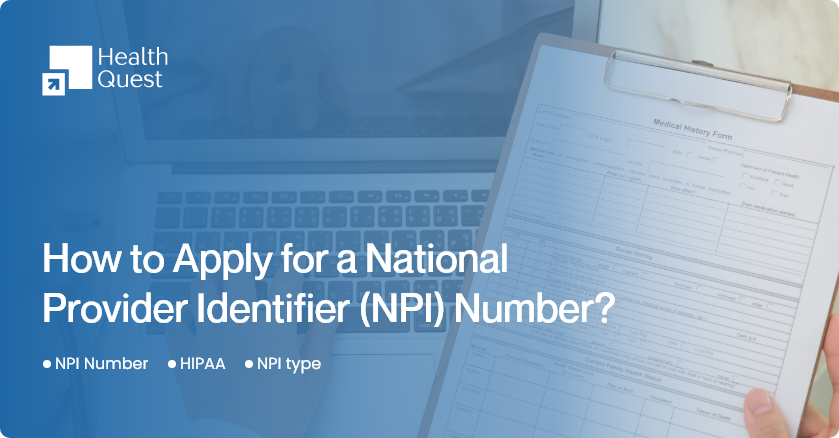If you want to get paid in healthcare, you need an NPI. The National Provider Identifier is a unique 10-digit number required for billing insurance, submitting claims, and getting credentialed. Whether you’re a physician, therapist, or medical biller, your NPI is your professional ID in the U.S. healthcare system.
According to CMS, millions of providers now use NPIs for all HIPAA-standard transactions. It’s the first step to legitimacy, no NPI, no reimbursements. In this guide, we’ll walk you through exactly how to apply for yours, clearly and without the red tape.
What Is an NPI?
NPI stands for National Provider Identifier. It’s a unique, 10-digit identification number assigned to healthcare providers in the United States by the Centers for Medicare & Medicaid Services (CMS).
NPIs are used to identify providers in all HIPAA-standard electronic healthcare transactions like claim submissions, eligibility checks, referrals, and more. Think of it as a universal provider ID that stays with you throughout your career, regardless of job, location, or specialty changes.
Types of NPI Numbers:

There are two types of NPI numbers, and each one is used for a different purpose in healthcare:
| NPI Type | Description | Examples |
|---|---|---|
| Type 1 NPI (Individual Providers) |
A unique identifier for individual healthcare professionals. It stays with the provider regardless of job location or specialty. Used to identify the specific person who delivered care on claims. |
|
| Type 2 NPI (Organizations) |
Assigned to healthcare organizations or groups. It identifies the facility as a whole, not a single provider. Used when organizations submit claims or billing information. |
|
Who Needs an NPI?
An NPI is required for more than just physicians. If you bill insurance or handle HIPAA-standard transactions, you likely need one. This includes:
| NPI Type | Who Needs It |
|---|---|
| Type 1 NPI (Individual Providers) |
|
| Type 2 NPI (Organizations) |
|
Why were NPIs introduced?
National Provider Identifiers (NPIs) were introduced to address several challenges in the healthcare system related to provider identification. Before NPIs, providers often had to use multiple different identification numbers assigned by various health plans and government programs, which created confusion and inefficiencies. The goal was to create a good, standardized system to improve healthcare transactions nationwide.
Standardization:
Before NPIs, healthcare providers used multiple identification numbers assigned by different health plans, Medicare, Medicaid, and other entities. This caused confusion and inefficiency.
Simplification:
NPIs were created to provide a single, unique identifier for each healthcare provider across the entire U.S. healthcare system.
Compliance with HIPAA:
The introduction of NPIs was mandated by the Health Insurance Portability and Accountability Act (HIPAA) of 1996 to improve the efficiency and effectiveness of electronic healthcare transactions.
Reduce Fraud and Errors:
Having a unique identifier helps reduce errors in claims processing and combats fraud by ensuring the correct provider is identified.
Why an NPI Is Essential for Healthcare Billing and Provider Verification
The National Provider Identifier (NPI) is essential for identifying healthcare providers across the U.S. healthcare system. It ensures that all transactions involving providers are accurate and efficient.
Universal ID:
NPIs provide a standardized identification number recognized by all health plans, insurance companies, and government programs. This eliminates confusion caused by multiple provider IDs and helps in accurately identifying individuals and organizations nationwide.
Simplifies Billing:
By using NPIs, healthcare providers can submit claims more quickly and with fewer errors. This speeds up the reimbursement process, reduces claim denials, and improves overall billing efficiency.
Consistent Data:
NPIs ensure that provider information remains consistent across all electronic transactions, including claims, referrals, prior authorizations, and eligibility checks. This uniformity helps reduce administrative burdens and prevents mistakes caused by incorrect or outdated provider details.
Required by Law:
HIPAA regulations mandate the use of NPIs, and most payers and government programs require providers to have an NPI for billing and enrollment. This makes NPIs a critical compliance element for healthcare providers.
Supports Data Sharing:
NPIs facilitate the secure exchange of medical records and healthcare information among providers, insurers, and other entities. This promotes better coordination of care and improves patient outcomes by ensuring the right provider information is available at the right time.
Why NPI Is Vital for Medical Billing Accuracy and Efficiency

The National Provider Identifier (NPI) is a crucial element in medical billing that ensures accurate and efficient processing of healthcare claims. It serves as a unique identifier for healthcare providers, helping to streamline billing workflows and reduce errors.
Accurate Provider Identification
NPIs play a critical role in accurately identifying the billing and rendering providers in a healthcare transaction. Before NPIs, providers often used multiple ID numbers across different payers, which led to claim mismatches and confusion. With an NPI, each provider is uniquely identified across all systems and payers, reducing the risk of claim denials due to misidentification.
Required for Claims Submission
Submitting claims without a valid NPI can result in automatic rejection by insurance companies, Medicare, and Medicaid. NPIs are required on CMS-1500, UB-04, and electronic claim formats (ANSI 837) to ensure claims are processed correctly. It is also essential for submitting prior authorizations, referrals, and eligibility verifications.
Speeds Up Reimbursement
By eliminating duplicate or incorrect provider records, NPIs help reduce claim rejections and rework. This leads to faster adjudication and quicker payment turnaround. Billing systems and clearinghouses rely on the NPI to match providers to payer contracts and ensure accurate routing of payments.
Reduces Administrative Errors
The universal use of NPIs eliminates the need for providers to maintain and track multiple legacy IDs for different payers. This consistency reduces manual entry errors and administrative overhead, especially when dealing with multi-state or multi-payer billing environments.
Supports Compliance
NPIs are part of the HIPAA transaction and code set standards, making their use legally required for all covered entities. Failure to include or misuse an NPI on billing documents can lead to compliance violations, audits, or delays in payment. Keeping NPI records up to date in systems like PECOS and CAQH also supports provider enrollment and credentialing accuracy.
Enhances Data Reporting
NPIs improve the quality of data used for reporting, auditing, and analysis. Health plans and providers can track claims, utilization patterns, and referral trends using the NPI as a consistent identifier. This also supports fraud detection efforts and improves accountability in provider performance metrics.
Facilitates Provider Enrollment and Credentialing
In addition to billing, NPIs are essential during provider enrollment with payers and networks. They help verify credentials, specialties, practice locations, and affiliations. An incorrect or missing NPI can delay the enrollment process and affect a provider’s ability to bill for services.
Essential for Health IT Systems
Most electronic health records (EHRs), practice management systems, and clearinghouses are designed to work with NPIs. This makes it easier to exchange information between systems, ensure interoperability, and comply with standards for electronic healthcare transactions.
How to Apply for an NPI Number?

Applying for an NPI is free and can be done online in just a few steps. Whether you’re a solo provider or an organization, here’s how to get started:
Determine Your NPI Type
There are two types of NPIs, so before you get started, determine what your NPI type is.
- Type 1: For individual healthcare providers (e.g., physicians, nurse practitioners, therapists).
- Type 2: For organizations or group practices (e.g., hospitals, clinics, billing services).
Go to the NPPES Website
Visit the National Plan and Provider Enumeration System (NPPES) at: https://nppes.cms.hhs.gov. Click on “Create or Manage an Account” to begin.
Create a Login.gov Account
Since 2021, a Login.gov account is required to access the NPPES system. To get started, visit https://www.login.gov and create a free account. It’s recommended to use the same email address for both your Login.gov and NPPES accounts to ensure consistency and avoid access issues later.
Complete the Online NPI Application
Once logged in:
- Select “Apply for an NPI”.
- Choose the correct NPI type (individual or organization).
- Fill out all required information, including:
- Name, DOB, SSN or EIN
- Practice location and mailing address
- Taxonomy (your provider specialty)
- License and state info
- Name, DOB, SSN or EIN
Submit the Application
After reviewing your information, apply electronically. You’ll receive a tracking number for reference.
Wait for Confirmation
You’ll usually receive your NPI number via email within 1–5 business days. You can also check the status on the NPPES website.
How do I apply for an NPI by mail?
You can apply or update your NPI by completing and signing the paper application form, then mailing it to the following address:
NPI Enumerator
7125 Ambassador Rd. Ste 100
Windsor Mill, MD 21244
Common Mistakes to Avoid When Applying for an NPI
Applying for an NPI is simple, but small mistakes can delay approval. Watch out for:
- Choosing the wrong NPI type (individual vs. organization)
- Using different emails or mismatched practice addresses
- Selecting the wrong taxonomy code for your specialty
- Forgetting to enter license details or using the wrong EIN
Final Thought
Getting your NPI is more than just checking off a box; it’s your first official step into the U.S. healthcare system. Whether you’re billing insurance, joining a provider network, or enrolling in Medicare, your NPI is your professional fingerprint. Apply early, avoid common mistakes, and keep your information up to date to ensure smooth billing, credentialing, and compliance down the line.
Need Help Applying for Your NPI?
Applying for an NPI might seem simple, but one small error can delay your entire credentialing and billing process. At Health Quest, we specialize in helping individual providers and healthcare organizations use NPI applications quickly and accurately, without the confusion or red tape. Whether you’re unsure which NPI type to select, need help with taxonomy codes, or want us to handle the entire process for you, we’re here to make it effortless.
Let our credentialing experts take it off your plate so you can focus on care, not paperwork. Contact us today to get started.



